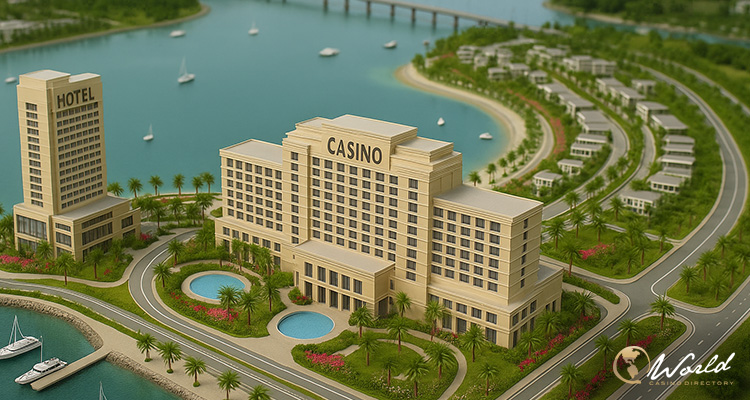Vietnam has formally approved the development of a massive casino and integrated resort complex in Van Don, Quang Ninh province, marking one of the country’s most significant tourism and gaming investments to date. Deputy Prime Minister Tran Hong Ha signed off on the investment policy on June 27, according to VN Express, giving the green light for a project with an estimated capital outlay of at least $2 billion and a projected operational lifespan of up to 70 years.
Set within the Van Don Economic Zone, the project will occupy more than 244 hectares of land in Van Yen commune. Of this, 182 hectares are designated for the resort’s main components—including a casino, luxury hotels, high-end villas, entertainment facilities, and landscaped parks. Meanwhile, 62 hectares of naturally forested areas—comprising 38 hectares of protected forest and nearly 24 hectares of production forest—must remain undisturbed in accordance with Vietnam’s forestry protection regulations. These forested sections will be managed under existing environmental and land-use laws and are not to be included in the land leased or allocated for development.
The Ministry of Finance previously submitted the proposal for the project in late May 2025, following an earlier recommendation from the Ministry of Planning and Investment at the end of 2023. Quang Ninh authorities had already listed the site in April 2025 among plots open for public bidding to determine the investor.
Aiming for Global Appeal, Pending Local Gambling Access
The resort has been envisioned as a luxury destination that integrates tourism, entertainment, and hospitality, including gaming operations. According to official planning documents, the complex is expected to become a globally attractive location for upscale travelers and large-scale events, with the casino as a key feature.
However, access to casino gaming for Vietnamese citizens remains uncertain. While the Ministry of Finance has proposed including Van Don in Vietnam’s pilot program permitting locals to gamble—first tested at Phu Quoc’s Corona Resort & Casino—the government has yet to approve this aspect. As outlined in the official decree, casino operations and any allowance for Vietnamese citizens to participate “would only be permitted once all legal conditions are met.”
Project Timeline and Phased Investment Structure
The resort will be built in three phases over a nine-year period. The proposed investment structure includes approximately VND7.7 trillion (around $302 million) in investor equity, with the remaining capital sourced from loans. The construction phases are projected as follows:
- Phase 1 (2023–2027): VND25.1 trillion
- Phase 2 (2027–2031): VND22.08 trillion
- Phase 3 (2031–2032): VND4.3 trillion
If completed on schedule, the resort could begin operations by 2032.
Economic Contributions and Long-Term Impact
Once operational, the Van Don integrated resort is expected to employ approximately 6,000 workers and contribute significantly to Vietnam’s national and local economies. Forecasts suggest that the complex could generate around VND8.16 trillion ($312.7 million) in average post-tax annual profits. The project’s total tax contribution over its 70-year operating period is estimated at over VND228 trillion (equivalent to more than $9.6 billion), encompassing both corporate and value-added taxes.
In terms of return on investment, authorities estimate the project will need nearly 33 years to break even. After covering all expenses and recouping capital, the net profit could reach approximately VND4.35 trillion ($167 million). These projections underscore the government’s expectation that the resort will serve as a long-term financial pillar in the region.
Infrastructure Support and Social Planning
The Quang Ninh Provincial People’s Committee has been assigned the responsibility of selecting an investor through a formal bidding process. In tandem, the local Economic Zone Management Board is tasked with developing social infrastructure for project workers, including housing and essential community facilities. Planners are also urged to allocate land for sports and cultural amenities that will benefit both local residents and tourists.
The Van Don project is part of a broader strategic vision to position the area as a diversified marine economic hub by 2030. The province already hosts key infrastructure like the Van Don International Airport, the Ha Long–Van Don–Mong Cai expressway, and the Ao Tien seaport. These assets have previously attracted significant interest in local real estate, especially during the 2018–2019 boom years, when land plots surged in value. Although market activity has since cooled, the new casino-resort is anticipated to revitalize investor sentiment in the region.
Strategic Importance and Broader Context
Vietnam’s decision to move forward with the Van Don project reflects a broader effort to expand the country’s footprint in the high-end tourism and gaming sector. The project also underscores the government’s cautious but ongoing interest in evolving its stance on domestic gambling access. Tim Nguyen, Director of Fortuna Investments, stated: “The reactivation of the Van Don project, especially with the likely extension of the locals entry pilot, signals a strong move toward a more commercially viable gaming sector.”
While questions remain—especially regarding whether the local access pilot will resume and how investors will respond—the approval marks a pivotal step toward transforming Van Don into a premier regional destination for luxury travel and integrated entertainment.


